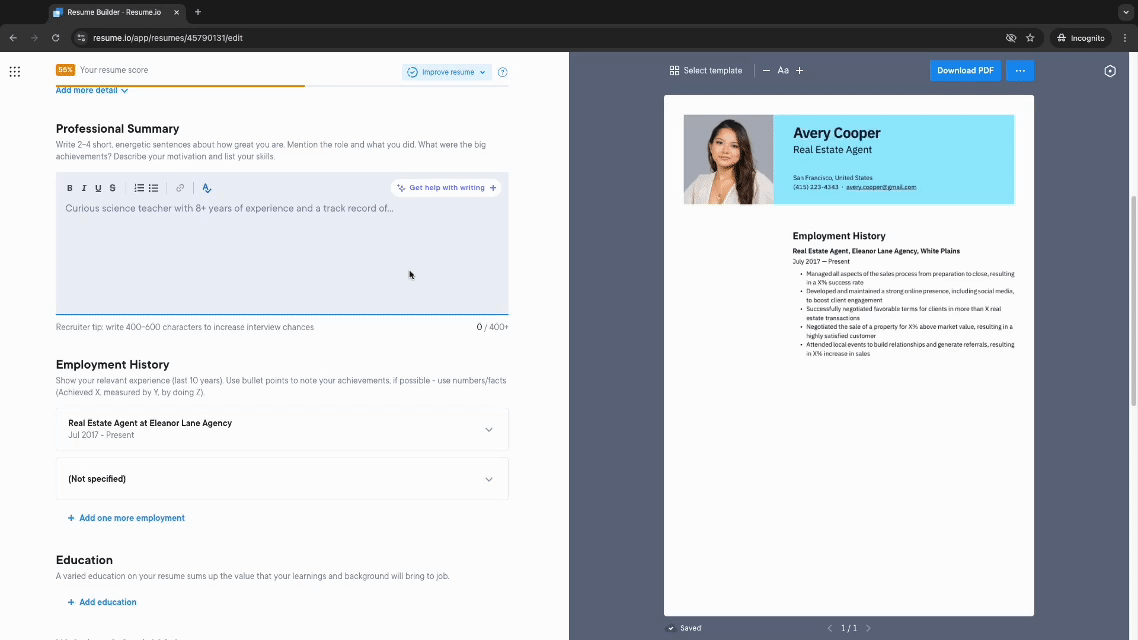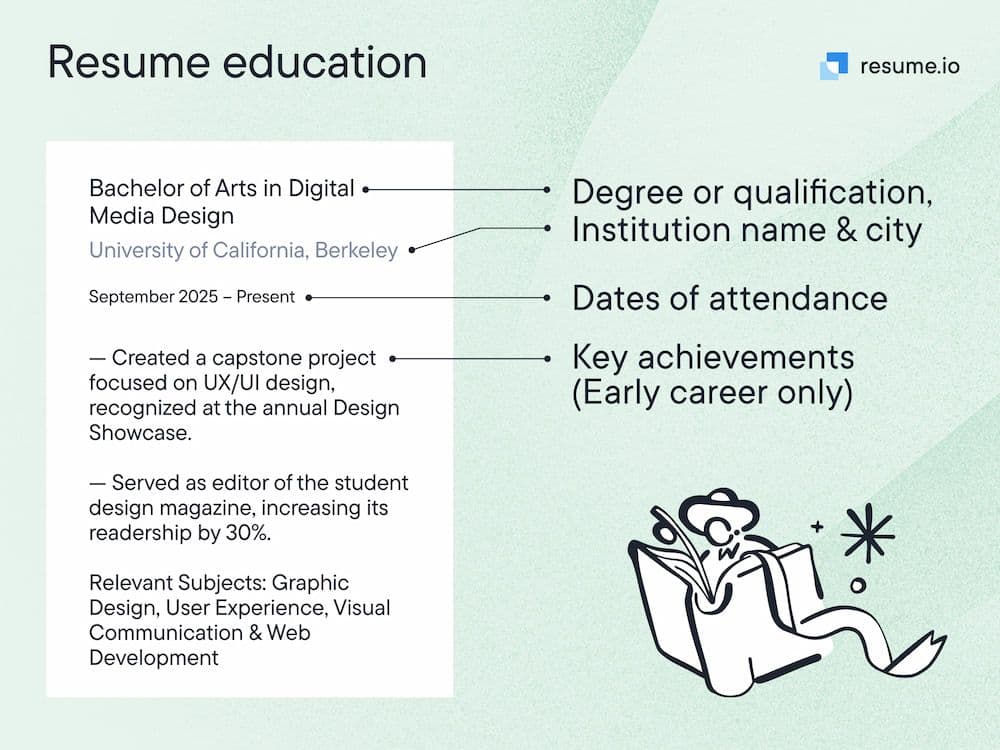Certifications show prospective employers that you’re willing to go the extra mile to grow your skills. In a crowded job market, a certification may be just what you need to give your resume an edge.
This guide breaks down how to list certifications on a resume, along with formatting tips and examples to help your resume stand out.
Where to put certifications on a resume
There are a few valuable places where you can put a certification on your resume. These options include:
In your resume header
You can list the certification after or below your name in your resume header. Put the certification on your resume here if it’s a requirement for the role, so that employers can instantly tell that you’re a qualified candidate.
You can also use a common abbreviation for the certification, such as “CPA” for Certified Public Accountant, if it’s a recognizable term in your field.
John Williams, Certified Nursing Assistant (CNA)
In your resume summary

Mention a certification in your resume summary to get an employer’s attention quickly. You should list a certification on the resume here if it shows your specialization in the field or gives you an advantage over other applicants.
Results-driven Certified Digital Marketing Professional (CDMP) with over three years of experience executing campaigns using search engine optimization and pay-per-click strategies. Skilled in content optimization, A/B testing, and analytics tools.
In your resume education section

If you’ve earned a certification as part of your education or ongoing professional development, include it in your education section. It should go below your formal education, such as a bachelor’s degree.
For most people, an education section goes at the end of a resume. While it makes sense to add certifications to your resume here, you may still want to mention them in other areas, like the resume summary or personal statement.
Bachelor of Science in Computer Science
University of Maryland
AWS Certified Cloud Practitioner
Amazon Web Services, 2025
In a separate resume certification section

Do you have multiple certifications in your field? Shine a spotlight on those credentials by creating a separate “Certifications” section on your resume. List each certification in reverse chronological order.
If you’re changing careers, having a certifications section can also show an employer how you’ve prepared for the transition. Consider moving this section to the top of your resume to highlight your most relevant qualifications for a career change.
Certified ScrumMaster
Scrum Alliance, 2025
Google Data Analytics Professional Certificate
Coursera, 2024
In your resume work experience section

It’s less common to put certifications in your resume work experience section, but it may be a good option for some.
Mention the certification in a bullet point if it directly relates to the work you did in that role or if you earned it while on the job. Of course, make sure that the certification is also relevant to the job you’re applying for.
Delivery Driver | Transport Logistics
June 2023 - Present
- Managed long-haul shipments across multiple states with a Class A Commercial Driver’s License (CDL)
How to list certifications on a resume
When adding certifications to your resume header or summary, it’s fine to simply provide the name of the credential. But in other areas, like an education or certifications section, you should expand with a few more details.
Follow these key steps for how to list your certifications on a resume:
- Provide the name and organization. List the full name of the certification, and its common abbreviation if it’s widely known. Include the name of the certifying organization that issued you the credential.
- List the date you earned it. Typically, you only need to include the year the certification was issued, but you can include the month as well if it’s pertinent. If you’ve renewed the certification, list the date you last renewed it instead of the original issuing date.
- Give the expiration date, if applicable. If the certification must be renewed after a specific period, include the expiration date. For example, a CPR certification lasts for two years, so you should include the expiration date to show that you’re staying up to date on this training.
- Provide optional details. If you have room on your resume, include one or two bullet points describing how you earned the credential or why it’s helpful for your role.
Project Management Professional (PMP)
Project Management Institute, 2025
- Earned PMP certification to expand skills in project planning, execution, and budget management.
- Applied knowledge and methodologies to lead cross-functional teams on projects exceeding $500k.
What certifications to include on a resume
Choosing to add which of your certifications to a resume largely depends on your role and industry.
But generally speaking, these are some good certifications for a resume:
- Project Management Professional
- Microsoft Office Specialist
- ServSafe
- Certified ScrumMaster
- CompTIA A+
- Google Data Analytics
- Certified Public Accountant
- Certified Sales Professional
- Certified Business Analysis Professional
- CPR
- First Aid
Most certifications require you to complete a course and/or take an exam. Some of these courses cost money, while others are offered for free.
These are some good resources for free or low-cost certifications:
- Coursera
- LinkedIn Learning
- Google Career Certificates
- HubSpot Academy
- Microsoft Learn
- edX
- Alison
- Udemy
- AWS Training and Certification
Get more ideas by checking out our article on great free certificate courses you can add to your resume!
FAQs about adding certifications to a resume
Here are some other frequently asked questions about how to add certifications to a resume:
When shouldn’t you list a certification on your resume?
Don’t list a certification on your resume if it’s not relevant to the job you’re targeting. For example, you don’t need to list a Microsoft Office certificate if you’re applying for jobs as a line cook.
Can you add certifications to your resume that are in progress?
Absolutely. An in-progress certification shows employers that you’re investing your time in gaining new skills or learning new processes. When adding in-progress certifications to your resume, list the name of the certification, the certifying organization, and the date you expect to earn it.
Should you put expired certifications on your resume?
In most cases, no. Your resume should reflect your current skill set. However, if you plan to renew the certification soon, you can include it on your resume with the expected renewal date.
How do you list online certifications on a resume?
List an online certification on your resume the same way you list other credentials. Optionally, you can also include a link to the certification. Our online resume builder allows you to link directly to your certification so that an employer can verify it.
Why include certifications on a resume?
Adding certifications to a resume can help it stand out to hiring managers, especially if you’re applying for jobs where candidates usually have similar qualifications. Getting a certification shows that you’re serious about improving your skills and knowledge. It also demonstrates your passion and dedication to your field.





